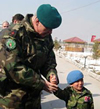The following are excerpts from an article by Sean Kane, senior program officer at the United States Institute of Peace and a Truman Security Fellow, published in the Christian Science Monitor on July 15, 2011.
America clearly faces sharp constraints in fully resourcing its military and civilian missions in Iraq. In this era of limited means, reinforcements need to be found to complement investments of American blood and treasure. This requires a revamped regional strategy that starts by asking which of Iraq’s neighbors share US interests in a strong and stable Iraq that can contribute to peace and stability in the Middle East. At present, Turkey stands out as the only neighbor that has the incentive to actively work toward this outcome.
This approach would be different from past appeals to Iran, Syria, and Saudi Arabia to recognize their interest in averting the all out collapse of Iraq. Not wanting to deal with the fall-out from a failed Iraqi state is different from wanting to see Iraq succeed.
There is a real convergence of interests between the United States, Turkey, and Iraq itself in supporting Baghdad’s still fragile multi-sectarian democracy and seeing its oil expansion strategy succeed. There is also a common denominator of wanting Iraq to maintain some balance in its complex relationship with Iran after American troops draw down. Ankara is well on its way to becoming Iraq’s leading trading partner and, in a renewal of the historical rivalry between the Ottoman and Persian empires in Mesopotamia, consciously sees itself in competition with Tehran for influence in Iraq. Given the general lack of engagement by Arab countries to date, Turkey is in fact now the main balancing factor to Iranian political and economic preeminence on the ground in Iraq.
In addition to civilian cooperation and responding to Iraqi military assistance requests, the US government should now proactively work to bolster Iraqi-Turkish trade, cooperation, and energy ties as a key part of its post-2011 Iraq strategy.
Such steps would require very little in the way of further direct investment of American resources and could have a substantial return by promoting the mutually beneficial relationship between Iraq and Turkey. And that relationship is in the best interest of the US because it could support stability in Iraq and the development of a regional dynamic that is not based on sectarian identity.

























